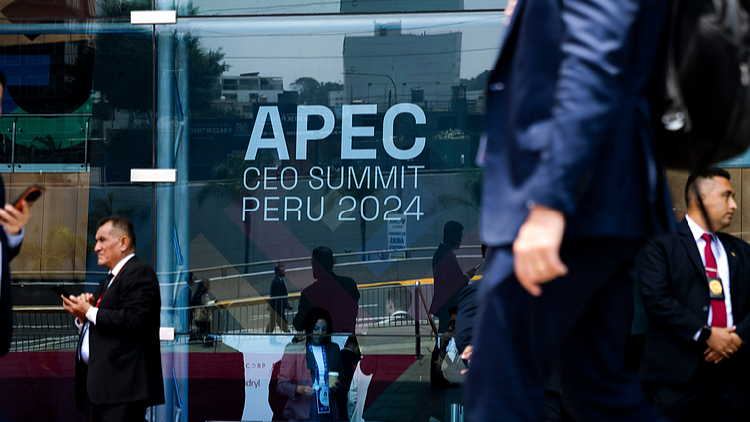China-US Economic Collaboration Key to Worldwide Prosperity
The 2024 APEC Economic Leaders' Meeting in Lima presents a significant opportunity for the world's two largest economies, China and the United States, to evaluate their positions in the Asia-Pacific region and beyond.

The 2024 Asia-Pacific Economic Cooperation (APEC) Economic Leaders' Meeting in Lima represents a crucial opportunity for the world's two largest economies, China and the United States, to reevaluate their positions within the Asia-Pacific region and beyond. The dynamics of the China-US relationship are intricate and multifaceted, oscillating between collaboration and rivalry. Over the past eight years of frequent interactions, both nations have increasingly recognized that enhancing their trade interdependence and economic cooperation can not only help stabilize international supply chains amid pressing global challenges but also establish a foundation for mutual growth, benefiting the national interests and long-term welfare of their citizens. The vision articulated by Chinese leadership underscored an essential principle: mutual economic benefit between China and the US is integral not just to the nations themselves but also to global prosperity.
APEC serves as a cornerstone for regional and global economic cooperation
Historically, APEC has been a vital platform for promoting regional economic integration. It exemplifies a cooperative framework that encourages dialogue, reduces trade barriers, and supports sustainable development among countries with varying political systems and developmental paths. China has highlighted APEC's significant role in making Asia and the Pacific the most dynamic economic zone and the primary engine of global economic expansion.
In a time characterized by rising unilateralism and protectionism that jeopardizes multilateral organizations, APEC showcases the merits of collaborative frameworks. China's initiative to foster an "open and interconnected paradigm" is a proactive response to global issues like disrupted supply chains, economic fragmentation, and rising geopolitical tensions. Programs like the Free Trade Area of the Asia-Pacific and China's commitment to the Regional Comprehensive Economic Partnership illustrate how regional frameworks can stimulate wider international economic advancement.
Economic ties between China and the US: A cornerstone for global prosperity
The economic interdependence between China and the US is notable. China ranks as America's third-largest trading partner, after Canada and Mexico, and serves as a significant destination for American exports. US Treasury Secretary Janet Yellen aptly remarked that these bonds require identifying a "way to coexist and share global prosperity." Despite political and ideological differences, the economic partnership has withstood fluctuations over decades, fueled by mutual interests in stability, innovation, and access to markets.
Navigating economic cooperation amid geopolitical tensions
While mutual benefit is evident in economic terms, political obstacles have complicated the US-China relationship. Washington's practice of linking economic policies with national security concerns—often evident through restrictions on technology transfers and investments—has strained bilateral ties. China has voiced criticism of such approaches, asserting that "overstretching the national security concept" undermines mutual trust and hinders economic advancement.
It was emphasized that "contradictions and differences between two major countries like China and the US are unavoidable." Nevertheless, the Chinese perspective highlights the necessity of placing mutual respect and peaceful coexistence at the forefront of the China-US relationship to avert conflicts from overshadowing shared economic aspirations.
Expanding bilateral trade and investment remains the most direct method to enhance mutual benefit. China's active efforts to conform to high-standard international trade regulations, including its pursuit of membership in the Comprehensive and Progressive Agreement for Trans-Pacific Partnership and the Digital Economy Partnership Agreement, present opportunities for deepened collaboration. Green development emerges as a critical domain for cooperation. Both nations are pivotal players in the global shift toward a low-carbon economy, and collaboration in renewable energy, electric vehicles, and carbon trading could result in transformative advantages. Building grassroots trust is crucial for a sustainable bilateral relationship, underscored by both leaders who acknowledged the significance of people-to-people exchanges in their discussions. The restoration of over 20 communication channels, including those addressing trade, finance, and climate change, marks a positive development.
Global ramifications of China-US economic collaboration
A cooperative relationship between China and the US holds significant implications for global stability and prosperity. Joint initiatives to tackle issues like climate change, technological advancement, and public health could establish benchmarks for international cooperation. Moreover, their capability to stabilize global supply chains and promote open trade would benefit both developed and developing nations alike.
The 2024 APEC Economic Leaders' Meeting reaffirmed the shared responsibilities of China and the US in ensuring their economic relationship serves as a foundation for global stability and progress. As both nations seek to navigate differences and broaden their areas of cooperation, they must remain oriented by principles of mutual respect, peaceful coexistence, and win-win collaboration. A robust and stable China-US economic partnership not only enriches their economies but also provides a crucial basis for addressing the pressing global challenges of our era.
By promoting openness, advancing green innovation, and enhancing dialogue, China and the US can forge a path to a more prosperous future for all. As an ancient Chinese proverb wisely states, "When you open your arms to embrace the world, the world embraces you in return."
Ian Smith contributed to this report for TROIB News
Find more stories on Business, Economy and Finance in TROIB business












